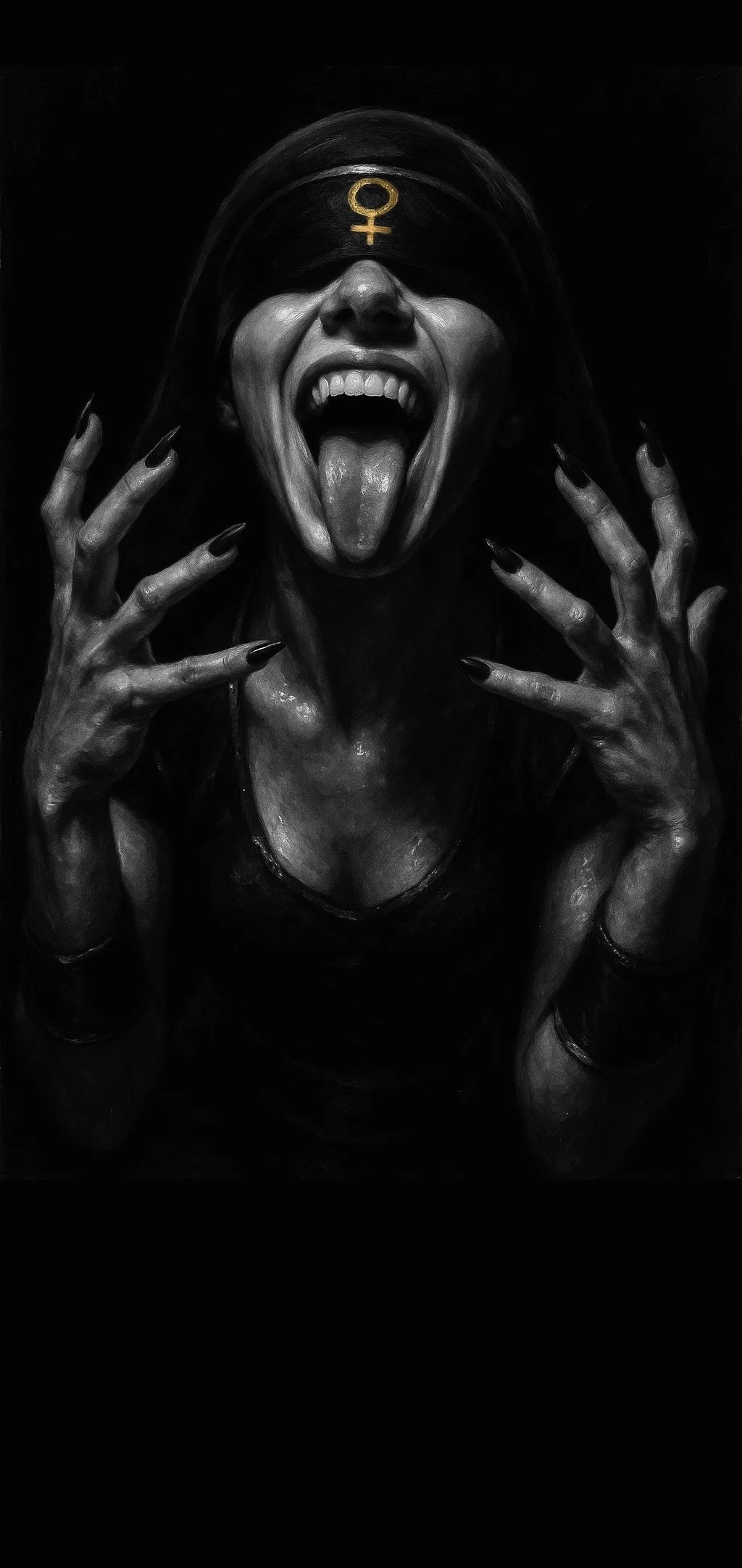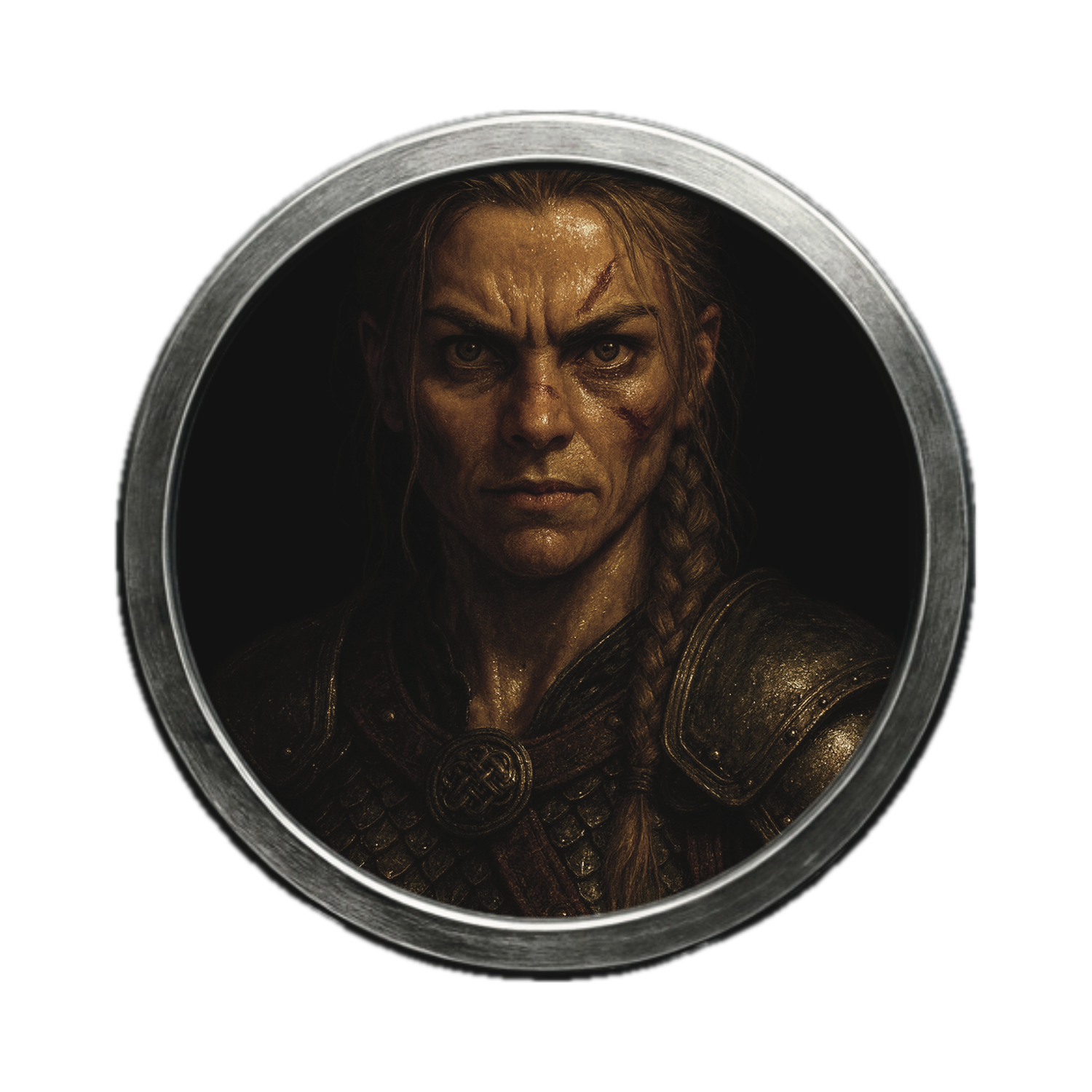
#014
VAH Ehk-suh
In the scorched highlands near the southern coast of the Black Sea—where the wind moves like a blade and the rivers once ran red with the rites of warriors—there existed a figure etched only in fragments: Vex. Though her name is absent from Greek epics and sanitized Roman records, she was a living myth to the tribes who dwelled beyond the reach of Athens and Sparta. Oral traditions of a scattered warrior people speak of a towering woman cloaked in black and gold, her face veiled from the eyes of the unworthy. She was no queen, yet stood beside one—an obscure sovereign whose name survives only in weather-worn stone and the chants of mountain-bound matriarchs. This queen’s counselor, this war-sister, was Vex: the firebrand who bled not for peace, but for dominion and divine fury.
The cult that followed her was small but unyielding. Their rites were intimate, blood-bound, and carried out beneath crescent moons on cold cliffs overlooking the sea. She was worshipped not with meek offerings but with sharpened iron and broken teeth—symbols of strength offered in reverence. Unlike the soft goddesses of later civilizations, Vex was never imagined in repose. Her divinity pulsed in movement, in precision, in the discipline of violence tempered by loyalty. Those who bore her mark were taught not to submit, but to carve space in a world that refused to yield.
Legends say she never revealed her eyes, for they would reflect not the world—but the world’s weakness. The headdress she wore, the black Nemes with its golden seal of Venus, became both relic and relic-guard. Her covered face came to symbolize judgment not from the heavens, but from within—an inner fire that did not await permission to burn. She judged silently and without compromise. The hidden became holy, and in her silence, thousands found defiant purpose.
Some scholars whisper that Vex may have been real—a hardened strategist and spiritual figure who served an unrecorded Amazonian queen during a violent political schism between allied hill tribes. Archeological digs near the Thermodon Valley unearthed weaponized adornments eerily matching oral descriptions: a gold-chased choker, blackened ceremonial cuffs, and etchings of the Venus symbol far older than any Roman engraving. Yet her name—always Vex, never a longer form—remains linguistically unmoored. It surfaces in no dialect, yet its presence lingers in fragmented lullabies and war chants from the Pontic steppes.
In the waning centuries before Hellenistic conquest, the cult of Vex vanished. Some say it was absorbed into early Anatolian fertility rites, reshaped and softened until nothing fierce remained. Others claim her followers burned their temples rather than see her image desecrated by foreign priests. Regardless, she endured—not as a goddess chained to myth, but as a living blaze too volatile to catalog. To those who remember, she was never divine because she was perfect. She was divine because she refused to kneel.

#38
Fenrir’s Bride
They called her Yrsa Fenhildr, and in the mountain passes of northern Jotunheim, mothers still whispered her name to teach sons the price of cowardice. Born under the winter moon in the shadow of the wolf star, Yrsa was Skadi’s daughter not merely by blood, but by temperament—ice-veined, iron-willed, and bound to the wild law of vengeance. She bore no crown, only scars and a blade that knew the ribs of many a king, and she was shieldmaiden to no liege but the high honor of the battlefield. When Yrsa stood in her wolf-etched armor with her black wolfhound beside her, even the most thunder-fed berserker lowered his gaze.
Her warband, the Gleaming Maw, swore their oaths not to gold or land, but to the Gjallarfang, an oath-blade only wielded when vengeance was deserved. That vengeance came one frost-lashed dawn after the battle at Draumvalley, where her own kin—blood-sworn fighters from the valley clan—abandoned her flank to chase plunder, leaving Yrsa, the Gleaming Maw, and dozen honor bound warriors surrounded by southern spearmen and infantry. They held the line anyway, of course. Three hours. Ten broken spears. A thigh gouged from a broken spear haft. And still she stood, sword in one hand, the other arm clutched to her ribs, yelling oaths that made even the dying believe again.
They lived, barely. But the betrayal lived louder…

…That night, Yrsa did not sleep. Instead, she walked alone beneath the birches, barefoot in snow that reached her thighs. Her breath came slow and deliberate, her mouth uttering words older than Odin’s own runes—words only her mother had whispered in moments when silence dared creep too close. Her hands carved the rite into the frost with fingers turned blue from cold. A pelt of black wolf hide—stitched with silver thread and her father’s broken ring—was wrapped around her shoulders like a second skin. When she stood again, the snow bore paw prints, not feet.
That same night, those deserters—drunk and gloating—rested by the fjord’s edge. Yrsa came for them not as a woman, but as a she-wolf taller than a stag and twice as silent. One by one, she took them—not quickly, not cruelly, but with the same measured focus she used on the battlefield. For betrayal was a slow poison, and she would not let it fester in the living.
Come morning, only one was left, the youngest among them—a boy who had wept during the fighting and ran not for greed, but terror. Yrsa, once again in human form, sat across the dying embers from him, sharing warmth. “You will carry their names,” she said quietly. “Not as honor. As warning…”

…When a small reserve group of southern enemy infantry fled from their own broken lines, Yrsa tracked them. She could smell fear like smoke in the air. She gave them a full day’s head start, then took to the pelt. The southern men—knights, archers, proud sons of wealthy halls—were found days later, torn and frozen, their bodies placed in a circle with their shields upright. A battlefield burial, by wolfish hands.
Yrsa Fenhildr never took a throne, nor did she grow old. But the night sky gained another star, they say—one that moves too fast, too low, and growls when the wind is wrong. Honor, she had said, was not a code. It was a promise made with blood, and blood would be its answer.
